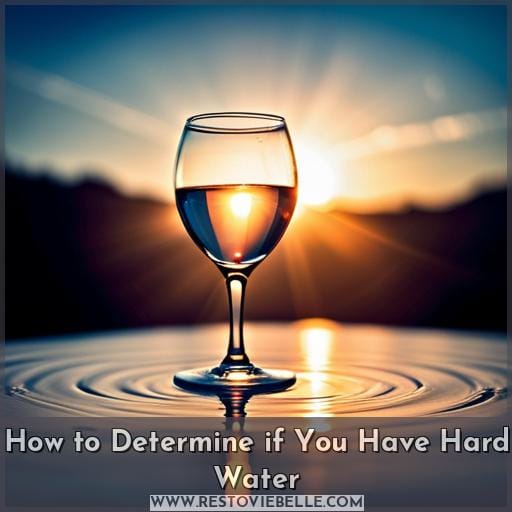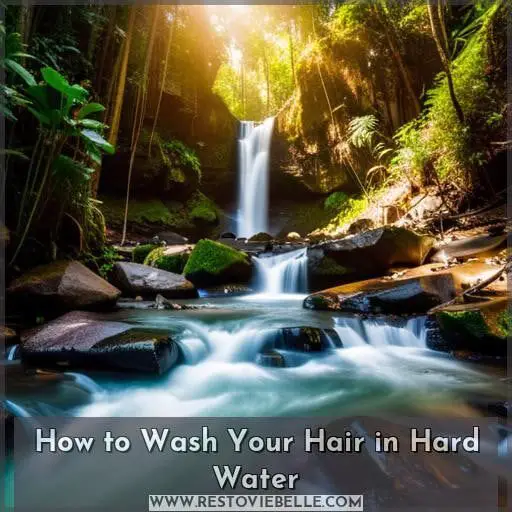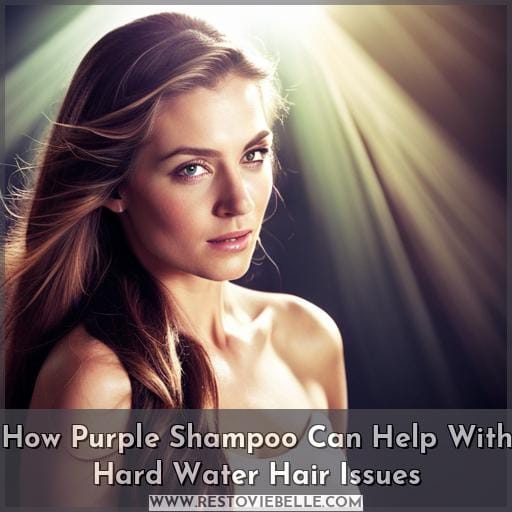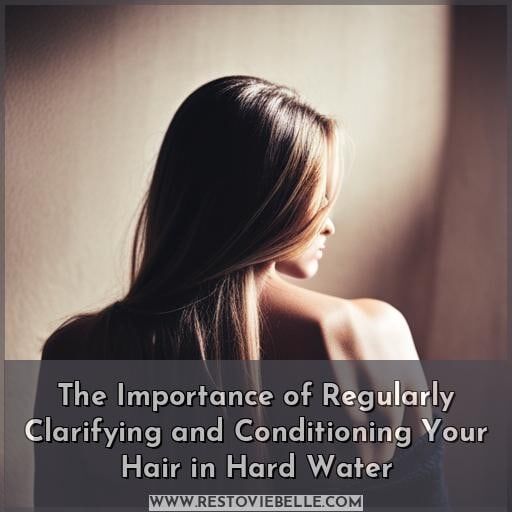This site is supported by our readers. We may earn a commission, at no cost to you, if you purchase through links.
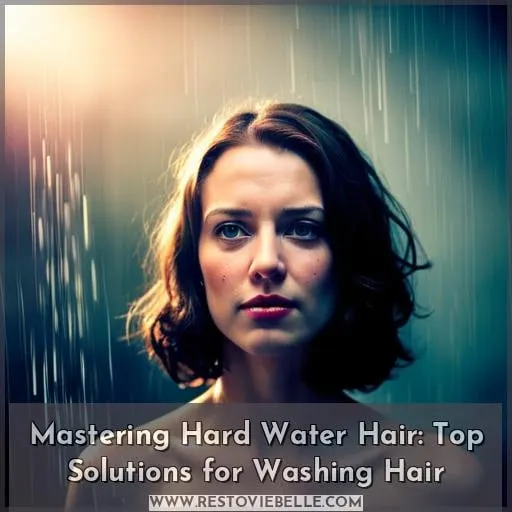 Have you ever noticed your hair feeling dry and lifeless after washing it? It might be caused by hard water. Hard water is full of minerals like calcium and magnesium, which can interact with your shampoo to leave a residue on the scalp and strands that make it harder for moisture to penetrate.
Have you ever noticed your hair feeling dry and lifeless after washing it? It might be caused by hard water. Hard water is full of minerals like calcium and magnesium, which can interact with your shampoo to leave a residue on the scalp and strands that make it harder for moisture to penetrate.
But don’t worry—there are plenty of ways you can fight back against this common issue! Read on to learn more about how hard water affects hair, as well as top solutions for keeping your locks healthy while dealing with hard water.
From shower head filters to purple shampoos, there’s something here for everyone looking to master their hard-water-hair woes!
Table Of Contents
- Key Takeaways
- What is Hard Water and How Does It Affect Hair?
- How to Determine if You Have Hard Water
- Top 5 Solutions to Protect Your Hair From Hard Water
- How to Wash Your Hair in Hard Water
- The Benefits of Using a Water Softener System or Showerhead Filter
- How Purple Shampoo Can Help With Hard Water Hair Issues
- The Importance of Regularly Clarifying and Conditioning Your Hair in Hard Water
- Conclusion
Key Takeaways
- Use chelating shampoos to remove mineral buildup and restore shine.
- Consider using a showerhead filter or water softener system to reduce mineral buildup in the water.
- Incorporate moisturizing masks and leave-in conditioners to hydrate and protect the hair.
- Rinsing with purified bottled water can help prevent mineral damage to the hair.
What is Hard Water and How Does It Affect Hair?
You may not be aware, but hard water can cause mineral buildup on hair, dryness, and damage, leading to color fading and dullness. This is due to the calcium and magnesium salts in hard water that react with shampoos, reducing their effectiveness over time.
Mineral Build-Up on Hair
Hard water can leave your hair feeling rough and dry due to mineral buildup, leading to dullness, tangling, and breakage. To combat it, start by testing your water hardness levels for optimal shampoo selection.
Hair care products containing chelating agents may help remove the mineral buildup from the scalp and strands, while showerhead filters or whole-home solutions provide long-term relief. Natural remedies such as vinegar rinses or citrus juices also offer temporary benefits in restoring shine and combating dandruff caused by hard water exposure.
Dryness and Damage
The dryness and damage caused by hard water can leave your hair dull, brittle, and prone to breakage. Hair care products may be rendered ineffective due to mineral buildup from hard water. To prevent further damage, it is important to detect the presence of hard water in order to take appropriate steps, such as installing a shower filter or a whole-house water softener system, for long-term benefits.
Color Fading and Dullness
Dullness and faded color in your hair can be a sign of hard water damage. To prevent discoloration, protect your hair with water testing, mineral removal shampoos, brightening conditioners, and final rinse bottled or filtered water.
Mineral buildup can lead to yellow tones as well as dryness and breakage. This is due to calcium deposits on the scalp causing a hard-water induced headache. Hair discoloration is an annoying result of this mineral build-up. It will need more than just a basic wash routine for resolution.
Investing in products that target these issues, along with long-term solutions like shower filters or softeners, will bring back life to dull tresses affected by harsh minerals found in hard waters!
How to Determine if You Have Hard Water
If you suspect that your water is hard, it’s important to determine the level of hardness in order to protect your hair. The easiest way to do this is with a Water Hardness Test Strip kit, which can be purchased from most hardware stores.
With these strips, you simply dip them into the water and wait for a color change. Green indicates soft water, while yellow or orange indicate harder levels of mineral deposits.
Once you know the degree of hardness in your shower or sink, there are several effective solutions for protecting both scalp health and hair color:
- Installing an AquaBliss Shower Filter Chrome filter on each showerhead will reduce chlorine, pesticides, and other pollutants commonly found in hard waters, as well as prevent scale buildup.
- Chelating shampoos help remove mineral buildup caused by hard waters, while clarifying products like EDTA help restore shine without stripping away too much moisture from strands.
- A final rinse with bottled or filtered purified water leaves hair softer than regular tap water would otherwise leave it.
- Leave-in conditioners also offset drying effects caused by minerals present in hard waters, so look out for ones containing natural oils such as coconut oil, almond oil, etc.
- Natural remedies like vinegar rinses (1 tbsp per 3 cups) can be used occasionally if needed, but they should not replace regular detoxing shampoos nor conditioning treatments meant specifically for providing additional nourishment against harsh environmental factors, such as those usually related to high concentrations of calcium/magnesium salts often seen when testing highly concentrated hard waters.
Top 5 Solutions to Protect Your Hair From Hard Water
If you’re dealing with hard water, it can be damaging to your hair. To protect your locks from its effects, there are several solutions available, such as showerhead water filters, clarifying shampoos, and naturally acidic rinses like vinegar or citrus juice.
Moisturizing masks and leave-in conditioners can help offset the drying effects of hard water too. For a more long-term solution against minerals in the tap, opt for purified bottled water when washing your hair instead.
Shower Head Water Filters
Try a showerhead water filter to reduce the effects of hard water on your hair and skin. Test your water with Water Hardness Test Strips for accurate results. Install an AquaBliss Shower Filter Chrome for easy filtration, saving you money and restoring damaged hair, skin, and nails.
Clarifying Shampoos
Rejuvenate your hair and combat hard water buildup with chelating and clarifying shampoos! Chelating benefits include removing mineral buildup, protecting hair from damage, and restoring shine. Natural remedies such as vinegar or citrus rinses can also help prevent further damage.
Water test strips can determine water hardness levels, while shower filters reduce chlorine and scale buildup effects on hair.
Naturally Acidic Rinses
For naturally softening hard water, try an acidic rinse like a vinegar or citrus juice solution. These natural remedies help restore pH balance and reduce mineral buildup for improved hair health.
Moisturizing Masks and Leave-in Conditioners
Treat your tresses to a luxurious mask or leave-in conditioner for maximum hydration and protection from hard water damage. Moisturizing masks help repair existing damage, while leave-in conditioners provide softening solutions that prevent tangling and retain moisture.
Purified Bottled Water
Try rinsing your hair with purified bottled water for ultimate protection against hard water damage. Alternatives to softening the effects of hard mineral-rich waters are few, but a simple solution is using filtered or purified bottled water.
Purified bottled water offers numerous benefits when it comes to caring for your hair. It can restore shine and fight dandruff with natural oils, while also preventing breakage caused by minerals that can weigh down strands.
How to Wash Your Hair in Hard Water
Reclaim your hair’s shine and strength by following this step-by-step guide for using filtered water.
- Start with the right shampoo selection: Choose a chelating shampoo to help remove mineral buildup from hard water, as well as other impurities that can cause damage to your hair. Avoid shampoos high in sulfates, which can further strip moisture from already damaged strands.
- Follow up with deep moisturizing conditioner: To restore much-needed hydration back into dry strands created by hard water minerals, use a deep conditioning treatment after every wash or once per week for optimal results. For added protection against future breakage caused by mineral deposits left behind on the scalp and hair shafts, consider adding an oil-based leave-in conditioner before styling products are used.
- The final rinse should always be done with either bottled or filtered tap/showerhead softener system installed at home so that all of those pesky minerals do not stay trapped within the strand structure causing itchy scalps and limp locks due to lack of moisture retention ability caused by hardened particles sitting atop each strand like tiny little rocks collecting dirt over time creating mass amounts of buildup leading to many types of scalp disorders alongside overall unhealthy-looking one-length style hairdos leaving you feeling hopelessly defeated unable even to comb through without having a full-blown headache induced by trying desperately to undo what regular washing efforts could never fix.
- Maintain proper care between washes: Taking care regularly maintain healthy cleanliness levels throughout one’s weekly routine is crucial when managing this type of challenge, avoid heavy oily product usage allow more frequent light rinses while incorporating natural remedies such as vinegar & citrus juice mixtures periodically during weeks where extra attention may need been put forth towards restoring balance & rejuvenation needs.
By taking these steps into consideration when washing your hair in hard water areas will ensure healthier shinier longer-lasting styles free from damage often seen amongst otherwise beautiful heads around town ready to showcase their newfound freedom!
The Benefits of Using a Water Softener System or Showerhead Filter
By using a water softener system or showerhead filter, you can significantly reduce mineral buildup in your hair and restore its health and shine. Not only will this help to protect against the damaging effects of hard water, but it also helps to nourish the scalp for healthier-looking locks.
Reduced Mineral Build-Up
By utilizing a water softener system or showerhead filter, you can experience reduced mineral build-up and revitalize your hair for a softer, healthier feel. Maintenance of such products is key. Pre-shampoo treatments are recommended to restore moisture lost from hard water.
Chelating shampoos also help remove excess minerals like calcium and magnesium that block conditioners from absorbing into the hair follicle. For those with thinning or damaged hair due to hard water damage, specialized products such as leave-in conditioners can protect against further breakage and dryness while providing extra hydration.
Hair care specialists suggest using filtered bottled waters during rinsing for optimal results when washing in areas with high levels of hardness in their tap water supply.
Restored Hair Health and Shine
You can wave goodbye to dull, damaged hair and say hello to soft, shiny locks by using a water softener system or showerhead filter. A quality filter will reduce mineral buildup from hard water that causes discoloration and dryness.
Haircare products like clarifying shampoos and conditioners with metal detox properties are also effective in removing residue when washing your hair in hard-water areas. Apple cider vinegar is an inexpensive natural solution for restoring shine, while purple shampoo helps neutralize yellow tones caused by the presence of metal ions.
Installing a whole house water filtration system is another great way to improve overall hair health.
How Purple Shampoo Can Help With Hard Water Hair Issues
Purple shampoo can be a great solution for hard water hair damage, helping to neutralize brassiness and restore shine. It does this by depositing tiny amounts of violet dye onto the hair that offset any yellow or orange tones caused by minerals in the water.
Here are some tips on how to use it effectively:
- Application Tips: Purple shampoo should be applied at least once every week or two, depending on your haircare routine and how much time you spend in hard water. Make sure you apply evenly across all strands of your hair from root to tip before rinsing off thoroughly with lukewarm (not hot) water after 5 minutes.
- Best Brands: Look for purple shampoos with natural ingredients like Aloe Vera, Green Tea Extracts, Chamomile Extracts, etc., as these help nourish your scalp and keep it healthy while counteracting brassy colors from hardwater minerals as well! Some popular brands include Redken Blondage Shampoo/Conditioner Duo set or Joico Color Balance Blue Shampoo/Conditioner Duo Set.
- Frequency Recommendations: Depending on how often you wash your hair will determine when is best for using purple shampoo – if you’re washing more frequently than normal due to swimming in chlorine pools then aim towards 2x per week instead of 1x! For those who rarely wash their locks try alternating between regular clarifying shampoos one day followed up next day with a good quality deep conditioning mask treatment before applying purple shampoo again few days later.
- Alternatives To Purple Shampoo: If there’s still no improvement after consistently using high-quality products containing anti-brass properties such as blueberries extract, chamomile extracts, etc.
The Importance of Regularly Clarifying and Conditioning Your Hair in Hard Water
You’d be amazed at the transformation that regularly clarifying and conditioning your hair can make, even in hard water scenarios! Clarifying benefits include removing buildup of minerals from hard water, which can leave hair feeling dry and brittle.
With regular conditioning treatments, you’ll restore moisture to your locks while preventing future damage due to mineral build-up. One way is by testing the hardness of your shower or tap water with a Water Hardness Test Strip; if it’s greater than 200 ppm (11 grains per gallon), then consider using a filter for added protection against mineral residue on strands.
When it comes to conditioners specifically designed for use in hard water areas, look out for those that are sulfate-free as they’ll help retain natural oils needed for maximum hydration without any deposit left behind from soap molecules reacting poorly with calcium ions found in high levels of dissolved salts like magnesium or iron bicarbonates.
Conclusion
Hard water can cause an array of hair issues, from mineral build-up to dryness and damage. Fortunately, there are simple solutions to help protect your hair from hard water.
From installing a shower head water filter to using clarifying shampoos and naturally acidic rinses, you can effectively combat hard water damage. Cleansing with a water softener system or showerhead filter will reduce mineral buildup and restore hair health and shine.
To finish, a purple shampoo can help with hard water hair issues, and it’s important to regularly clarify and condition your hair in hard water. Mastering hard water hair is achievable with the right solutions and techniques.
